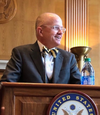A Case for Faithful Presence
Introduction
For the past 3-½ years, I have had the privilege to minister to those working in our nation’s capital. While those serving here desire to change the world, they are also under immense stress from internal and external sources that hinder their spiritual growth and our flourishing. Faithful Presence was created to address the need for a gospel-centered, reformed ministry committed to “equipping servants and leaders in working in Washington to flourish as they participate in Christ’s mission of making all things new, through offering intentional Spiritual, Emotional, Relational, Vocational, Ideological, Cultural and Missional Discipleship.” In other words, “Whole Discipleship for the Whole of Life.”
Situation
Those working in Washington, D.C, are among the nation’s brightest and most dedicated to seeking this country’s flourishing. There are nearly 20,000 members and staff on Capitol Hill serving in the Legislative Branch and 200,000 appointed and career officials working in the Executive Branch. Additionally, tens of thousands are working in policy centers hoping to shape the thought of leaders, as lobbyists advocating for corporate and organizational interests, and as diplomats working to advance the agendas of their home country.
Those leading here make decisions with far-reaching impacts on economic flourishing, justice, healthcare, environmental care, and foreign policy. They are in a position to advocate for and implement policies that seek the welfare of the city, country, and world.
Problem
In Washington, the effects of the fall are on full display. The Apostle Paul writes in Galatians 5: 20-21, “the works of the flesh are evident...enmity, strife, jealousy, fits of anger, rivalries, dissensions, divisions, envy.” Our nightly news testifies to the presence of these sins with such regularity, it has become white noise and expected behavior.
Further, a recent Barna study revealed that from 2009-2019 the number of people who never use their Bibles increased from 25% to 37% (an increase of 50%). Although over 80% of those who indicated a regular use of the Bible said it increased their relationship with God, less than 25% credited the Bible with affecting how they thought about racial issues, refugees, decisions at work, and issues of ethics and sexuality.


Implication
The effects of sin and incomplete discipleship negatively impact our nation’s flourishing and the lives of those working in government.
From a personal standpoint, followers, seekers, and skeptics face daily challenges of workplace strife, vocational futility, and hopelessness. Many are experiencing acute emotional stress and cultural pressure to achieve and conform.
On the policy side, inefficiencies brought on by personal and relational brokenness, coupled with ideologies out of accord with the gospel-centered theology, often result in policies that discourage justice, mercy, and flourishing.
Need
In Jeremiah, the LORD commands the prophet to direct the people being exiled to Babylon to “seek the welfare of the city into which I have sent you.” This is a seemingly counterintuitive approach for a people moving to a kingdom that does not acknowledge God. For seventy years, Daniel and others did just as instructed. We, too, are exiles. In 1 Peter 2:9-12, the Apostle writes to those he refers to as “elect (chosen by God) exiles,”
9 But you are a chosen race, a royal priesthood, a holy nation, a people for his own possession, that you may proclaim the excellencies of him who called you out of darkness into his marvelous light. 10 Once you were not a people, but now you are God’s people; once you had not received mercy, but now you have received mercy. 11 Beloved, I urge you as sojourners and exiles to abstain from the passions of the flesh, which wage war against your soul. 12 Keep your conduct among the Gentiles honorable, so that when they speak against you as evildoers, they may see your good deeds and glorify God on the day of visitation.
Peter is writing to individuals who have little to no political agency. Yet, he is encouraging them to engage in a life of faithful presence in proclaiming the excellencies of Christ and His gospel.
What is needed to address the ramifications of the fall in Washington and incomplete discipleship is whole discipleship for the whole of life.
That is why we are launching Faithful Presence. To offer whole life discipleship through “equipping servants and leaders in working in Washington to flourish as they participate in Christ’s mission of making all things new, through offering intentional Spiritual, Emotional, Relational, Vocational, Ideological, Cultural and Missional Discipleship.”
End of Part 1.
